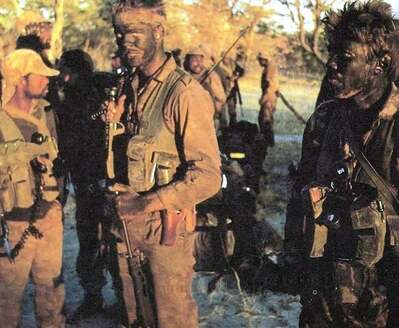 "For God has not given us a spirit of fear, but of power and of love and of a sound mind." 2 Timothy 1:7 In the South African Infantry we were taught: "You have never lived until you have almost died and for those who fight for it, life has a flavour the protected will never know." At Milton High School, in Bulawayo, I was taught Rudyard Kipling's inspiring poem on courage and integrity. Kipling stated that this was modelled on the life and character of Rhodesia's Chief Justice and Administrator, Leander Star Jameson: 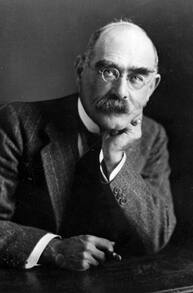 IF "If you can keep your head when all about you are losing theirs and blaming it on you; If you can trust yourself when all men doubt you, but make allowance for their doubting too. If you can wait but not be tired by waiting, or being lied about not deal in lies, or being hated don't give way to hating, and yet don't look too good nor talk too wise. If you can dream and yet not make dreams your master, If you can think and not make thoughts your aim, If you can meet with triumph, or disaster and treat those two imposters just the same, If you can bear to hear the truth you've spoken twisted by knaves to make a trap for fools; or watch the thing you gave your life to broken and stoop to build them up with worn out tools; If you can make one heap of all your winnings and risk it on one turn of pitch and toss, and lose and start again at your beginnings and never breath a word about your loss; If you can force your heart and nerve and sinew to serve your turn long after they've gone; and so hold on when there's nothing in you except the will that says to them: 'Hold on!'; If you can talk to crowds and keep your virtue, and walk with kings nor lose the common touch; If neither foes nor loving friends can hurt you. If all men count with you, but none too much, If you can fill the unforgiving minute with sixty seconds worth of distance run, yours is the earth and everything in it, and which is more you'll be a man my son." Rudyard Kipling What is Courage? Courage is not the absence of fear, but the determination to do our duty in spite of our fear. Some rational, God given sense of caution can protect us and our loved ones and prolong life. But if fear paralyses us into inactivity, neutrality, compromise, cowardice, defeat and disobedience, then it is evil. 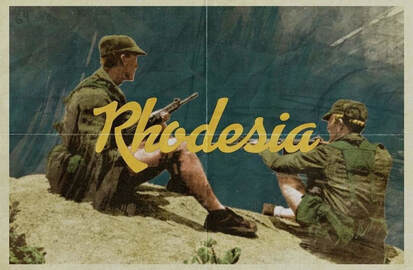 Remembering Rhodesia 11 November is packed full of meaning for anyone whose relatives fought in the World Wars, and for all who had the privilege of growing up in Rhodesia. 51 Years ago on Thursday, 11 November 1965, at the most solemn moment of the 11th hour of Armistice Day, Ian Douglas Smith, the Prime Minister of Rhodesia, signed Rhodesia's Unilateral Declaration of Independence from Great Britain. Remembrance Day Throughout the English speaking world, the 11th November is observed as a Remembrance Day to solemnly recall the end of hostilities of World War One at the 11th hour of the 11th day of the 11th month of 1918. In time, it has come to be observed as a Memorial Day for all who died in both World Wars and in other subsequent conflicts. Remember the Fallen The two minute silence to remember all who paid the supreme sacrifice began in Cape Town, South Africa. When the first casualty list recording the horrific loss of life in the Battle of Delville Wood, 1916, was announced in Cape Town, Mr J.A. Eagar, a Cape Town business man, suggested that his congregation observe a special time of silence to remember those in the South African Infantry casualty list. Sir Percy Fitzpatrick, the famous South African author of Jock of the Bushveld, was also a member of that congregation. 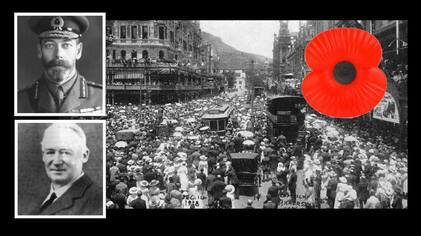 A Time of Intercession In May 1918, Mr R.R. Brydon, a city councillor, suggested to the Mayor of Cape Town, Sir Harry Hands, that a period of silence to remember those engaged in the Battlefields of Europe on the Western Front be initiated formerly at the firing of the noon day gun from Signal Hill. In May 1918, Sir Harry Hands, as Mayor, announced that 14 May 1918 at the sound of the noon day gun there would be a three minute pause. At the corner of Adderley and Darling streets, a trumpeter would sound the Last Post to reverberate throughout the city during which time all were to stop what they were doing, stand still and bow their heads in silent prayer, praying for those engaged in the conflict, remembering those who had died and thanking God for those who had survived. Personal Losses Mr Brydon's son, Major Walter Brydon had been wounded three times and gassed once. He was killed in action on the Western Front, 12 April 1918. A few days later, Captain Richard Hands, the son of the Mayor of Cape Town, Sir Harry Hands, a member of Brydon's battery, was mortally wounded in the same battle in which Major Brydon had been killed. The midday prayer time initiated by the noon day gun was last observed on 17 January 1919. An Empire Wide Time of Prayer and Remembrance Sir Percy Fitzpatrick, Member of Parliament, wrote to King George V, to propose a two minute silence throughout the Empire on 11 November 1919, to mark the first anniversary of the Armistice which ended the great war. On 7 November 1919, King George V proclaimed: "That at the hour when the Armistice came into force, the 11th hour of the 11th day of the 11th month, there may be, for the brief space of two minutes, a complete suspension of all our normal activities… so that in perfect stillness the thoughts of everyone may be concentrated on reverend remembrance of the glorious dead." The king instructed his secretary to communicate to Sir Percy Fitzpatrick: "The King, who learns that you are shortly to return to South Africa, desires me to assure you that he ever gratefully remembers the idea of the two minute pause on Armistice Day was due to your initiation, a suggestion readily adopted and carried out with heartfelt sympathy throughout the Empire." 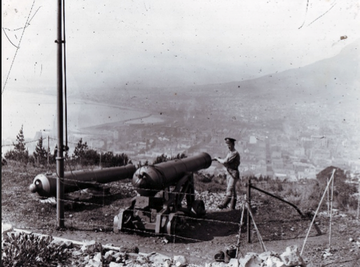 The Noon Day Guns The noonday gun has been an historic time signal in Cape Town since 1806. The guns were originally used to announce the arrival of a ship. The original guns - 18 pounder smooth ball muzzle loaders - are still in use today. These are the oldest guns still in daily use in the world. The guns are maintained by the South African Navy. Lest We Forget During my Missionary travels I have been struck by how many hundreds of War Memorials there are throughout the world. Every town and village in the British Isles, and in Rhodesia and South Africa, have Memorials to the fallen of World Wars One and Two. Even at Victoria Falls, close to the new statue of Dr. David Livingstone, erected in 2005 on the Zambian side, there is a War Memorial listing the names of people from Northern Rhodesia, who fought and died for Britain. Honour Rolls At Milton High School in Rhodesia, we would be reminded daily of the vast numbers of past pupils who had given their lives "for King and Empire" in WWI and WWII. There were numerous wooden Rolls of Honour on the walls of our halls engraved with the names of past pupils and the dates of their death. 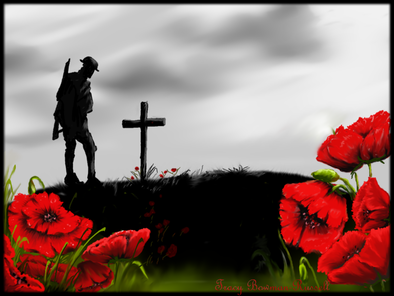 In Flanders Fields When I have visited the battlefields in Ypres, Belgium, I was struck by how many Hammonds are recorded in the Rolls of Honour on the walls of the War cemeteries, such as Menin Gate. There are many War cemeteries near Ypres for soldiers of the British Empire. I have by no means visited all of these cemeteries, but I have visited the six largest and counted over 65 Hammonds listed as killed in action, in that one theatre of the First World War. According to the Commonwealth War Graves Commission 480 Hammonds died fighting for Britain in the First World War. Love in Action Numerous of the Memorials have this Scripture verse etched into the stone: "Greater love hath no man than this, that a man lay down his life for his friends." John 15:13. Others declare: "…unless a grain of wheat falls into the ground and dies, it remains alone; but if it dies, it produces much grain." John 12:24 Blood Swept Lands and Seas During a 2014 Mission to England, I saw the beginning of the Tower of London Memorial for those who fell in the First World War. Beginning on 4 August 1914, marking the 100th anniversary of Britain's declaration of War against Germany, which launched WWI, 888,246 ceramic poppies were planted by volunteers in the moat surrounding the Tower of London. Entitled Blood Swept Lands and Seas of Red, this evolving memorial marked the number of soldiers who fell for the British Empire in the First World War. Every evening, Last Posts were played by bugle at sunset and names of those who died in the First Word War were read out to the crowds. 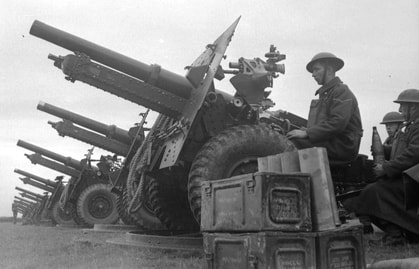 For King and Country My Father served in the Royal Artillery throughout the six years of World War II. Much of the Second World War, my Father served in the Eighth Army under Field Marshall Montgomery, in North Africa and Italy. My Dad operated a 25 Pounder. He was involved in the Battle of El Alamein. Ian Smith of Rhodesia The first time I saw Prime Minister Ian Smith, it was as a young boy of 14-years old, standing outside the Bulawayo Club in Rhodesia. I had heard from my Father that the Prime Minister was going to visit. Expecting some impressive entourage, I was standing by the entrance in Eighth Avenue with my cat, Tim. I can still remember my surprise as I saw a rather humble Peugeot 404 park in front of the Bulawayo Club and out stepped Mr Ian Smith. The Prime Minister was completely alone. There was no driver, or adjutant, no bodyguards, or policemen, visible anywhere. The Prime Minister had driven himself alone to the Club. He stroked my cat, who was sitting on the wall and smiled at me, then walked into the Club! Communist Contrast Almost 10 years later, I was in Harare, on Samora Machel Avenue when Zimbabwean dictator Robert Mugabe sped past. The contrast with Ian Smith's arrival could not have been more acute. First came 8 motorbike outriders, then police cars, armoured luxury Mercedes Benz’s with tinted windows, followed by another police car and a truck load of soldiers with heavy weapons, sirens blaring. All vehicles on both sides of the road had to come to a complete stop at the side. This, I was informed by residents, was how Mugabe travelled every day! 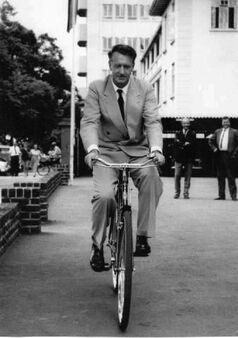 Fearing None but God When I mentioned this to Ian Smith, he laughed and commented that he feared God, he was a life-long Presbyterian, he believed in the Sovereignty of God, and he had survived the Second World War – he did not see what he had to be afraid of! In fact, during the war years, as Prime Minister, Ian Smith would frequently travel alone, without a convoy, scorning the real risk of an ambush, down to his farm near Gwelo. He would also often give all the staff at Independence (the Prime Minister's residence) the weekend off, so that there would not be so much as a cook in the kitchen or a policeman at the gate. He and his wife would be alone and that was the way he wanted it. He could not bear people fussing around him. "Behold, God is my salvation, I will trust and not be afraid; for the Lord is my strength and song; He also has become my salvation." Isaiah 12:2 Our Lord Jesus taught us that we should not fear man who can only kill the body, but rather we should learn to fear God alone who can destroy both body and soul in hell forever. The fear of God will free us from the fear of man. The reverential awe, respect and fear of God is liberating. "The fear of the Lord is the beginning of wisdom" Proverbs 1:7 Honourable Man of Integrity I have a photograph of Ian Smith cycling to work. Ian Smith was a remarkable statesman. A man of integrity. He said what he meant and he meant what he said. He was an example of an honourable man of his word. 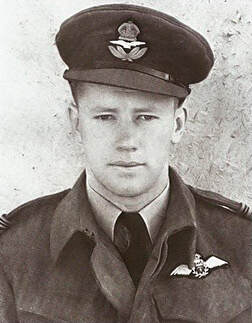 Flying Hurricanes for Britain Over the last 20 years of his life, I frequently had the privilege of having lunch, or tea, with Mr Smith. We read the Scriptures and prayed together on a number of occasions and I interviewed him for radio. Mr Smith devoted six years of his life flying in the Royal Rhodesian Air Force. With the outbreak of the Second World War, he joined the RRAF and served in 237 (Rhodesia) Squadron. He flew Hawker Hurricanes, serving in Egypt, Lebanon, Persia, Iraq, and then finally in the North African Desert War. He served at El-Alamein and Tobruk and was severely injured in a crash landing. He suffered a broken jaw, broken leg, broken shoulder and severe facial wounds. It was thought that his back was broken, but it turned out to be, as he put it, "only buckled". After 5 months of recuperating under expert medical attention in Cairo, he returned to active service, flying Spitfire Mark IX's. Spitfire Shot Down It was during the Italian campaign in 1944 that he was shot down. He had to jettison his canopy, release his harness and turn the Spitfire upside down, so that he could drop free, pull his ripcord and parachute to safety. For the next five months he evaded enemy patrols, joined up with the local Resistance and later crossed the Alps on foot, to link up with Allied forces in France. Double Standards One commentator at the time observed that it was: "…strange that the United States should spend American blood and money like water in Vietnam in order to deter Communism from spreading a few hundred miles further; but that same United States should be seeking to clear out of Africa those very people and governments that could effectively and forever bar the advance of Communism in that continent!" A.J.A. Peck, Rhodesia Accuses. 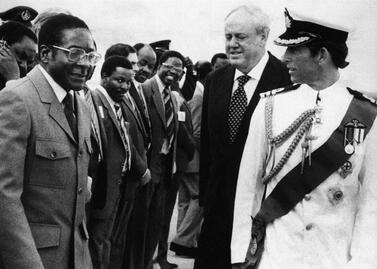 Never Beaten - Betrayed As the Prime Minister of Rhodesia, Mr. Ian Smith, declared: "We were never beaten by our enemies, we were betrayed by our friends." Loyal In the First and the Second World Wars, and in the Malayan Conflict, Rhodesia had provided more men, percentage to their population, than any other part of the British Empire and Commonwealth to fight for the West. Stabbed in the Back However, when Rhodesia was targeted by Soviet and Red Chinese trained and supported revolutionaries, our British, Canadian, Australian and American allies not only placed economic sanctions on Rhodesia, but even channelled funds towards the very terrorists who were murdering our people. Resisting Communist Aggression This year, 6 November, as we remember the attempt by Rhodesia to make a brave stand against the advance of Communism in Africa, we should remember the many courageous soldiers and civilians who gave their lives in that fight against terrorism and Marxism, and the many innocent victims of the terrorist onslaught. 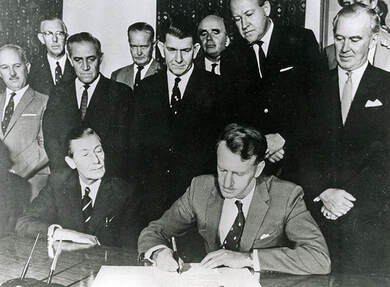 What Did Rhodesia's Stand and Sacrifices Achieve? In 1976, Ian Anderson of the League of Rhodesia wrote: "From Thermopylae (480 BC) to Malta (AD 1565)… it has often fallen to a small community of people to give moral examples to its larger and more powerful neighbours… in each case valuable breathing space was gained for other parties to rally to the cause and to complete the task so boldly initiated by faith. Duty and Destiny "We in Rhodesia have a very strong sense of national purpose. We feel we have been singled out by Providence to be the stumbling block in the path of Communist aggression. There is yet time for the Western powers to put Rhodesia's stand in its historical perspective; but they are leaving it dangerously late…" (Rhodesia: Myths and Facts) 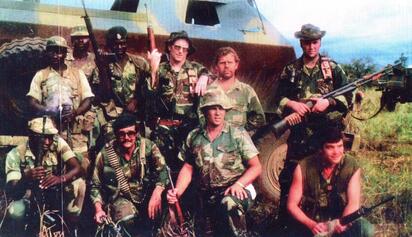 Holding the Line Against Communist Terrorism In standing firm against Communist aggression for 15 years, Rhodesia indeed won valuable breathing space for the free world. In much the same way as the 300 Spartans held up the enormous invading force of Persians at Thermopylae and as the courageous knights of St. John resisted the Islamic invasion of the small island of Malta, I believe that, in time, history will recognise that the sacrifices and courage of Rhodesians in resisting Communist terrorism contributed to the ultimate collapse of Communism in Eastern Europe in 1989. Had Rhodesia not resisted, the consequences for South Africa could have been absolutely disastrous. Had South Africa fallen to Communism during the Cold War, the strategic Cape sea route and vital minerals essential for Western industry and defence, would have fallen into the hands of the Soviet Union - with catastrophic consequences. Rhodesia has been Vindicated by History The reign of terror and state sponsored terrorism of Robert Mugabe's ZANU-PF regime in Zimbabwe have only vindicated Ian Smith's position. In time it will become even clearer that in no small measure Ronald Reagan's successful stand against Communist expansion in the 1980's was made possible by Rhodesia's stand against Communist terrorism in the 60's and 70's. 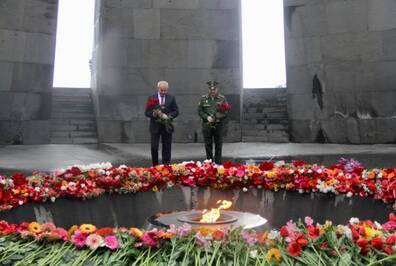 We are to Remember the Persecuted The Scripture commands us to care for widows and orphans, to love our neighbours, to remember the prisoner, and to serve our brothers and sisters who are being persecuted for their Faith and this is what Frontline Fellowship has been consistently doing for over 34 years. "Remember the prisoners as if chained with them – those who are mistreated – since you yourselves are in the body also."Hebrews 13:3. Mobilising Prayer and Action for the Persecuted Persistent prayer, publicity and pressure provide protection for the persecuted (Luke 18:1-7). Pray for the Christians suffering in Zimbabwe. Mobilise your congregation and Bible study group to pray. And write to your elected representative to urge decisive political and economic pressure to be brought to bear against the Communist ZANU regime in Zimbabwe. Encourage your church to support missions of mercy to the suffering Christians and destitute pensioners in Zimbabwe. Phone, fax or write to your nearest Zimbabwe embassy to protest against their racist and lawless policies of oppression. "Open your mouth for the speechless, in the cause of all who are appointed to die. Open your mouth, judge righteously, and plead the cause of the poor and needy." Proverbs 31:8-9 Christian Courage We are called to overcome the world: "Because He Who is in you is greater than he who is in the world." 1 John 4:4 The Will of God will never lead you where the grace of God cannot keep you. Where God guides He provides. God gives the best to those who leave the choice to Him. "I can do all things through Christ Who strengthens me." Philippians 4:13 "In the world you will have tribulation; but be of good cheer, I have overcome the world." John 16:33 The safest place in the world is in the centre of God's Will. Duty is ours, the results are God's. God's servant is God's responsibility. Then with David we can say: "I will not be afraid of ten thousands of people who have set themselves against me all around." Psalm 3:6 "The Lord is my light and my salvation; whom shall I fear? The Lord is the strength of my life; of whom shall I be afraid… though an army may encamp against me, my heart shall not fear; though war may arise against me, in this I will be confident." Psalm 27:1-3 The Middle verse of the Bible: "I called on the Lord in my distress; the Lord answered me… I will not fear. What can man do to me? It is better to trust in the Lord than to put confidence in man. It is better to trust in the Lord than to put confidence in princes." Psalm 118:5-9 "Be strong and of good courage, do not fear nor be afraid of them; for the Lord your God, He is the One who goes with you. He will never leave you nor forsake you." Deuteronomy 31:6 Dr. Peter Hammond Livingstone Fellowship P.O. Box 74 Newlands 7725 Cape Town South Africa Tel: 021-689-4480 [email protected] www.livingstonefellowship.co.za www.frontline.org.za www.ReformationSA.org.za The audio CD of this message, as presented on Remembrance Sunday by Dr. Peter Hammond, in Fish Hoek, is available from: from Christian Liberty Books, PO Box 358, Howard Place 7450, Cape Town, South Africa, Tel: 021-689-7478, Fax: 086-551-7490, Email: [email protected] and Website: www.christianlibertybooks.co.za. See also: Zimbabwe - A Lesson in How to Destroy Christian Civilisation
1 Comment
|
.
Categories
|
Archives
Articles Sorted by Date
November 2023
October 2023
September 2023
October 2021
April 2021
June 2020
May 2020
April 2020
March 2020
February 2020
October 2019
August 2019
June 2019
February 2019
August 2017
January 2017
November 2016
March 2016
January 2016
June 2012
May 2012
November 2010
August 2004
August 1993
June 1993
June 1991
August 1989
June 1989
 RSS Feed
RSS Feed
